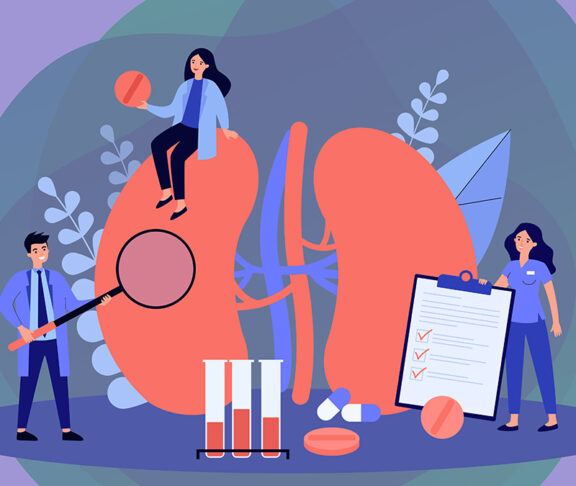Type 2 diabetes is a leading cause of kidney disease, according to the National Kidney Foundation. Chances are, if you’ve been diagnosed with one of these conditions, you’re familiar with the other from conversations in your doctor’s office.
If you’re not familiar, in diabetes, the body can’t process glucose (blood sugar) effectively, either because it uses the hormone insulin inappropriately or does not make enough insulin. The majority of people with diabetes have type 2 diabetes, which happens when cells are resistant to insulin (called insulin resistance), leading to hypoglycemia (high blood sugar). Complications of high blood sugar include problems with the nerves, eyes, heart, and, as the National Kidney Foundation points out, the kidneys.
Diabetes can damage nephrons, or filtering units, in the kidneys if blood sugar is poorly managed. Protein then spills into the urine and the kidneys can’t filter blood efficiently. As a result, kidney disease can develop.
Staying informed
Because diabetes is the leading cause of kidney disease — one-third of people with diabetes develop it — getting screened is imperative.
While your healthcare team should be your first stop for screenings and personalized health advice, you can turn to digital health information platforms — such as the National Kidney Foundation’s website — for tips.
Guarding your health
Diet-wise, adopting a balanced menu rich in whole foods including fruits and vegetables, and limiting more processed, packaged foods high in refined carbohydrates, can help promote healthy blood sugar levels.
Because heart disease is linked with both diabetes and kidney disease, be sure to manage high blood pressure by taking medication if necessary and regulating salt intake.
Also, don’t discount the importance of exercise for healthy blood sugar levels and kidneys.
Seeking treatment
Although everyone’s situation will be different, ask your doctor about treatment options for diabetes and kidney health, including metformin, SGLT2 inhibitors, and GLP-1 receptor agonists. ACE inhibitors or ARBs can be used to treat some cases of high blood pressure or protein in the urine. They can delay the loss of kidney function in individuals living with kidney disease and diabetes. Research exploring a combined treatment approach between ACE inhibitors and SGLT2 inhibitors for the same purpose is underway.
Finally, beware of treatments marketed as herbal remedies, which have the potential to harm the kidneys, and limit your use of NSAIDs like ibuprofen and naproxen, as these medicines can cause kidney damage when used in excess.
Even if you’re at risk for diabetes or kidney disease, or are living with these diseases already, know that you have options and a wealth of information at your fingertips through online resources to support you along the way. You can assess your risk of developing kidney disease by taking the Minute For Your Kidneys quiz on the National Kidney Foundation’s website.



